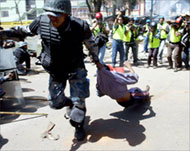Nepal king calls for elections
Nepal’s King Gyanendra has called for general elections in the Maoist-insurgency wracked nation after a bloody crackdown on week-long anti-royal protests.

“It is … our desire that with the active participation of all political parties committed to peace and democracy, a meaningful exercise in multi-party democracy be initiated through an exemplary democratic exercise,” the king said in his broadcast, timed to mark the start of Hindu New Year.
The announcement came as Kofi Annan, the UN secretary general, urged the Nepalese monarch to end the political emergency in his country that has left four protesters dead and hundreds detained in the past week.
Opposition leaders, lawyers and activists backed by Maoist rebels have been leading protests, calling for the restoration of democracy 14 months after the king seized direct control.
In his statement, the king did not mention the Maoist rebels, who formed a loose alliance with sidelined political parties last year.
In February, as part of his “roadmap to democracy,” the king allowed local elections without the participation of mainstream political parties.
The polls were marked by a dearth of candidates, a low turnout and international criticism.
His new call for elections and dialogue is unlikely to appease his opponents, who have called for an election to a constituent assembly to draw up a new constitution.
‘National dialogue’
The UN secretary general, meanwhile, raised the alarm over the bloodshed and political impasse in Nepal.
|
|
|
Annan said there was an urgent |
“He reiterates his call for an inclusive national dialogue of all Nepalese political forces, and for His Majesty to take courageous steps to find a way out of this situation and avoid further bloodshed,” Annan’s spokesmam said in a statement.
The statement said the Nepalese people wanted a “swift end to the conflict and instability and the immediate restoration of democracy”.
It added that “the loss of life and denial of legitimate rights should end without delay.”
The crackdown on rioters has been forceful.
On Thursday, police fired rubber bullets at a lawyers’ demonstration in the capital, injuring three participants.
Later in the day, a crowd of about 3,000 gathered in Gongabu, on the outskirts of the capital, and marched on the city’s ring road, calling for an end to Gyanendra’s rule.
Rebel Maoists have called on the army and police to join the anti-royal protest movement.
Nearly 12,500 people have been killed since the rebels began their “people’s war” in 1996.
